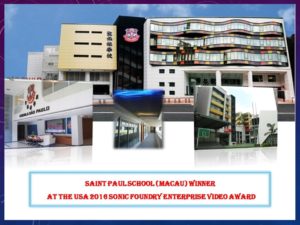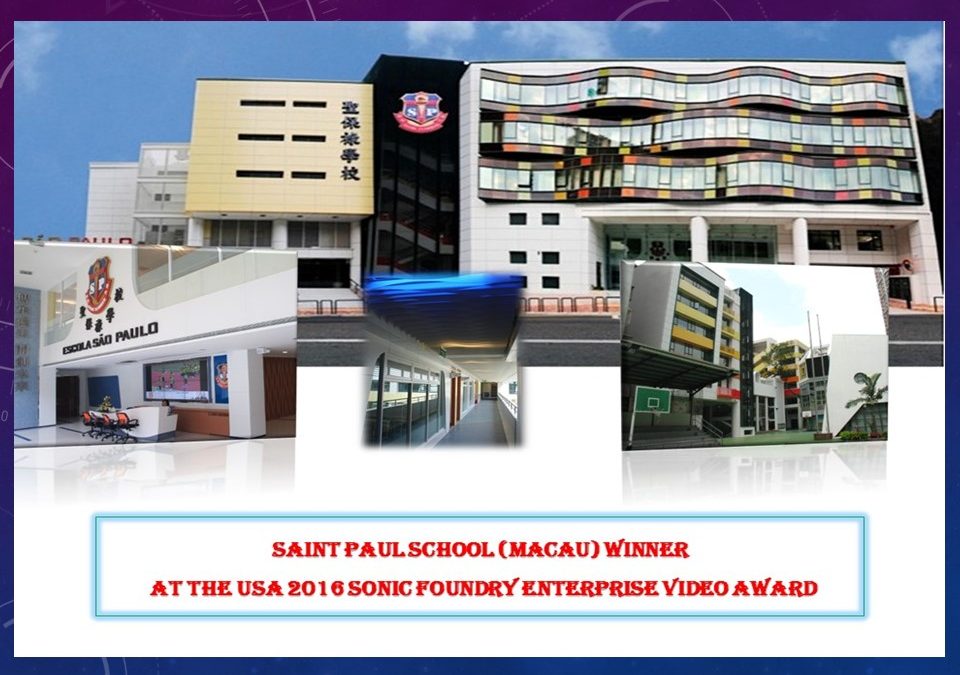Saint Paul School being a pioneering school in the introduction and use of ICT (Information and Communications Technology) in non-tertiary education, has been followed closely in their school’s deployment of ICT by many educational institutions, text-book publishing companies, government education bureaus and ICT system developers for several years.
Today, Saint Paul School supports one of the largest one-to-one programs in Asia with more than 1,700 students and 200 teachers using technology on a daily basis to facilitate teaching and learning.  The School’s innovative approach to large-scale ICT deployment through its ‘Classroom 2012’ project has received accolades from the press and experts in the education field. To-date, many schools and institutions from neighboring countries such as Japan, Korea, Singapore, Philippines, Hong Kong, Shanghai, and also from Spain and USA have visited the school to share and exchange ideas on its deployment model.
This innovative deployment of ICT in education to prepare students for the future is also unique in its cooperative effort between School, Government and Industry. Major participants involved in the success of the project include the Macau Education and Youth Affairs Bureau (DSEJ), Microsoft Macau, Lenovo China, H3C Hong Kong, Sonic Foundry, Inc. USA, Dyknow, Inc. USA, HP Hong Kong, and the Macau University of Science and Technology.
On May 2, 2016, Sonic Foundry, Inc. announced that Saint Paul School, Macau has been named a winner in the 12th annual Enterprise Video Awards in the Prolific Use category. The award is given for recognition in outstanding achievement in scaling video program in Education. The award, held by Sonic Foundry, Inc. a trusted global leader for video creation and management solutions, honor excellence in video integration into business, education, health and government. Most entries in the competition were from universities and private enterprises. Saint Paul School was the only non-tertiary school entry from outside the USA winning the award. “It’s an honor to recognize the best and most innovative ways our customers are using our products, and they never stop amazing us with their creativity. They’re great examples of why having a video strategy is essential to success in today’s digital world.â€Â said Rob Lipps, executive VP, Sonic Foundry.
 “I know the quality of our programs and the innovation that they bring into our classrooms, but honestly speaking I never thought we could be competing at the level of tertiary education institutions and private enterprises†said Dr. Alejandro Salcedo, OP, Principal of Saint Paul School, Macau “It is indeed an honor to receive this recognition, however, the affirmation that the school is on the right track in its strategy for using video in education is even more gratifying.â€
The school has also just begun  a three year project. Could you tell us a bit more about it?
“This project is part of the second phase in our overall strategy to improve education leveraging the power of ICT; whereas the‘Classroom 2012’ project focused on building the infrastructure and developing a culture of using technology in the school, this project is intended to affect teaching and learning through ‘Research-based learning’ approaches.†said Dr. Salcedo “Although more prevalent in colleges and universities, we will adapted many of the processes and techniques at the primary and secondary school levels, aiming to develop not only mastery of subject components but also to develop the student’s full range of intellectual, social, and emotional skills in context with real-world issues. One of the teaching and learning techniques that our teachers are already using is the ‘Flipped Classroom’ approach.â€Â Â
strategy to improve education leveraging the power of ICT; whereas the‘Classroom 2012’ project focused on building the infrastructure and developing a culture of using technology in the school, this project is intended to affect teaching and learning through ‘Research-based learning’ approaches.†said Dr. Salcedo “Although more prevalent in colleges and universities, we will adapted many of the processes and techniques at the primary and secondary school levels, aiming to develop not only mastery of subject components but also to develop the student’s full range of intellectual, social, and emotional skills in context with real-world issues. One of the teaching and learning techniques that our teachers are already using is the ‘Flipped Classroom’ approach.â€Â Â
Where is the value of the Flipped Classroom?
“The value of ‘Flipped Classroom’ is in the repurposing of class time into workshops where student who have already previewed or learned fundamental examples and key concepts outside of class, can continue on their enquiry about lecture content, test their skills in applying knowledge and interact with one another through hands-on activities guided by the teacher in the classroom†said Dr. Alejandro Salcedo “This encourages students to take responsibility for organizing, preparing and learning basic content outside of class, while using class time to dig-deeper for higher-level understanding through interaction with classmates and teacher .â€
What are the requirements and implications of implementing Flipped Classrooms?
“The ‘Flipped Classroom’ technique has no specific technologies requirement, however, access to technology by students and teachers can certainly facilitate and enhance the process, for example, video capture technology allows teachers not only to record videos for students to view at home but also report back to the teacher on the number of views and who viewed the video, students each equipped with a tablet PC and appropriate software can research and share content individually or in groups outside of class.†explained Manel Machado, Director of Academic Technology, Saint Paul School.
Dr. Salcedo noted that “Flipped Classroom places more of the responsibility for learning on the shoulders of our students, but at the same time it gives impetus to students to seek answers on their own and experiment more in their work towards mastering lesson content. Students with innovative ideas are encouraged to share and present their research with the class. There is also a change of role for teachers, they will no longer just be lecturers but rather act more like coaches or advisors, encouraging and guiding students in individual enquiry and collaborative work.â€
I remember that the DSEJ had supported the “Classroom 2012’ project through financial subsidies. What about this ‘Flipped Classroom’ project?
“First of all, I must say that the success of the ‘Classroom 2012’ project is due to many people, particularly the parents and students for their trust in the school, the school teachers and ICT team had also all worked really really hard in the implementation of the project. But I do not think that we would as successful without the support provided by the DSEJ. Besides financial assistance, many leaders and experts from the Education Department never ceased giving us encouragement, advices and assistance as best they could. Collaboration between the School and the DSEJ was really outstanding, based on trust and sharing of the same vision. This I think was even more critical to the success than the financial support.†the Principal remarked†Yes, the DSEJ has also substantially subsidized this three year project, with the condition that at the end of the three years, the school will provide the DSEJ with detail assessment reports of the projectâ€.
Saint Paul School (Macau) has increasingly established a reputation for being a leader in pioneering new educational programs for the 21st century using technology. This has been corroborated by appraisals from International Institutions and award recognitions such as in 2014 when the school’s ‘Classroom 2012’ project won the Merit award at Macau ICT Awards, and was nominated by the Macau Computer Society to participate in the Asia Pacific Information and Communication Technology Award 2014 (APICTA 2014) contest in Jakarta, Indonesia.
Congratulations to Saint Paul School and especially to the Saint Paul School Academic Technology Department for this award and their effort in contributing to Macau Education both locally and internationally.


